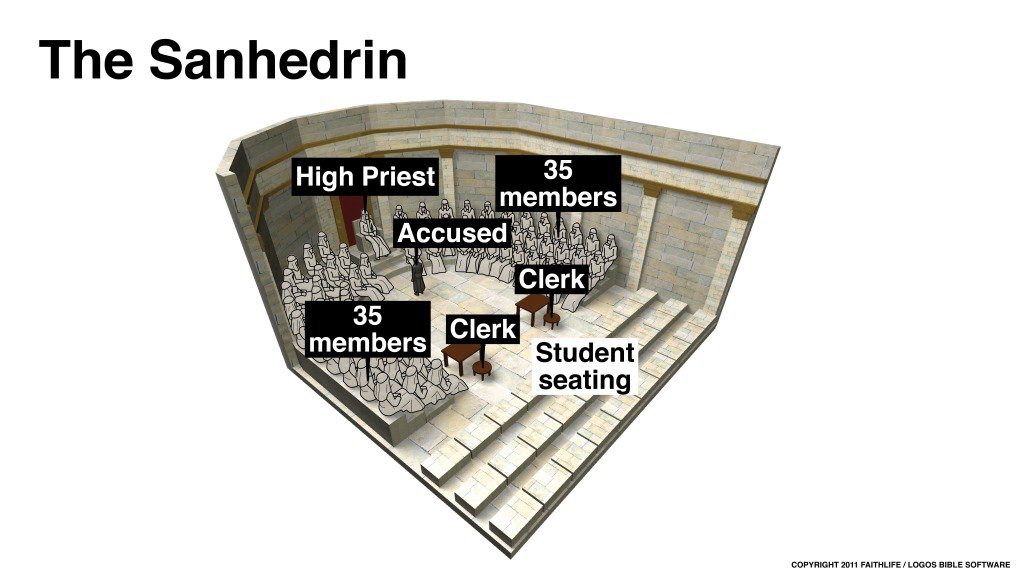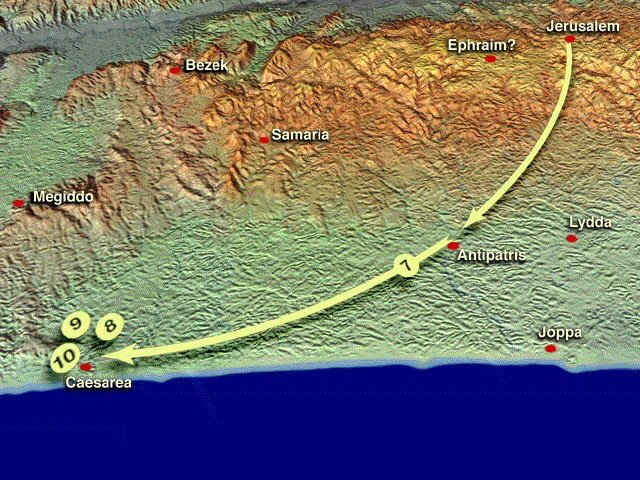Blog Post
Posted by Dion Todd November 3rd, 2018 4,817 Views 0 Comments
RHM Bible Study, Acts Chapter Twenty-three from Refreshing Hope Ministries on Vimeo.
Today we are going to study Acts chapter 23 in depth. You can follow along in your own Bible if you like. I will be reading from the World English Bible because it is the only modern English translation that is copyright free, and I can read the entire Bible on video without any legal drama or breaking anyone’s rules. After you finish this study, please take the accompanying quiz to test your knowledge. Thanks to everyone who has participated so far. Let’s get started:
First let’s set our location and do a brief catchup. In Acts chapter 22, Paul went in the temple of Jerusalem and some angry Jews started a riot and attempted to beat him to death. Roman soldiers from the nearby Antonia fortress intervened and rescued Paul from the mob. Paul then addressed the crowd from the steps of the guard barracks, and they listened until he said the word “Gentiles”. After this they began throwing dust in the air and shouting to rid the earth of him. The Roman soldiers unsure what Paul was even guilty of, so they took him to the Jewish high court, the Sanhedrin. That is where we begin our story today. Paul is standing before a hastily-prepared meeting of the Sanhedrin.
Acts Chapter 23 beginning in verse 1, reading from the World English Bible: Paul, looking steadfastly at the council, said, “Brothers, I have lived before God in all good conscience until today.”

2 The high priest, Ananias, commanded those who stood by him to strike him on the mouth.
Though this was not a disrespectful beginning, “the high priest Ananias ordered those standing near Paul to strike him on the mouth.” The order to strike Paul was illegal, for their Jewish law said, “He who strikes the cheek of one Israelite, strikes as it were the glory of God,” and “He that strikes a man strikes the Holy One.” Paul was well versed in the law; he was a Pharisee of Pharisees. All of this flashed through his mind in an instant, and like many of us, his mouth spoke before his brain thought:
3 Then Paul said to him, “God will strike you, you whitewashed wall! Do you sit to judge me according to the law, and command me to be struck contrary to the law?”
Can you imagine our court system today if you took the witness stand, said “Good morning” and the Judge told one of the officers to punch you in the mouth? That’s how Paul’s court case began. We can be sure that Paul intended to witness to them about Jesus and his conversion on the road to Damascus, but that was derailed with the rough beginning. Paul called the high priest a whitewashed wall, meaning that he looked pure on the outside, but that was a thin covering, over deep and obvious corruption.
The men of the Sanhedrin were supposed to be an example of the Law of Moses, so the command to have Paul struck was contrary to both the spirit and the letter of the law. Deuteronomy 25:1–2 says only a man found guilty can be beaten, and Paul had not yet been found guilty of anything. Yet the highest ruler there commanded that he be struck in the mouth.
Paul’s words about the court’s corruption were prophetic. The Ananias who was high priest at this time was well known for his greed. According to the ancient Jewish historian Josephus, Ananias even stole the tithes that belonged to the common priests for himself. He did not hesitate to use violence and assassination if furthered his interests. Later, because of his pro-Roman politics, he was hunted down and brutally killed by his own people.
There is no way to look at Paul’s response but as an angry, impulsive retaliation. Paul had momentarily lost control of his temper. His bitter reply was far different from the Lord Jesus. When they hurled their insults at Jesus, He did not retaliate. When He suffered, He made no threats (1 Peter 2:23).
God’s Word does not touch up its pictures of the lives of the saints. When an apostle or patriarch falls, the Bible details the fall as it happened. We read about David’s adultery and murder, along with Jonah’s pouting, and Peter’s violence. Failures are honestly recorded just as they happened. God loved David, but He placed into history all that David did: the good, the bad, and the ugly. Isn’t that scary to think about? It isn’t that God is mean, but only that He is honest and tells it like it is. He won’t lie to make His servants look good. So here we see the Apostle Paul as an angry man that has just been punched in the mouth.
4 Those who stood by said, “Do you malign God’s high priest?” 5 Paul said, “I didn’t know, brothers, that he was high priest. For it is written, ‘You shall not speak evil of a ruler of your people.’ ”
Paul knew that his outburst was wrong, so he apologized. He agreed that it was wrong to speak evil of the ruler of your people according to Exodus 22:28. Paul then said that he did not know that the man who commanded him to be punched was Ananias, the high priest. There are three thoughts on this:
1. Paul had been away from the council and the high circles of Jewish authority in Jerusalem for more than twenty years. Maybe he didn’t recognize the man who gave the order to strike him as the high priest.
2. Some think that he did not recognize the high priest because Paul’s eyesight was bad. This is based on Galatians 4:15 and 6:11, as well as from early written church traditions. Paul said that if it were possible, that the Galatians would have plucked out their own eyes and given them to him. (Galatians 4:15). Poor eyesight may have been Paul’s thorn in the flesh.
3. Others think that Paul was being sarcastic, with the idea: “I didn’t think that anyone who acted like that could be the high priest.”
6 But when Paul perceived that the one part were Sadducees and the other Pharisees, he cried out in the council, “Men and brothers, I am a Pharisee, a son of Pharisees. Concerning the hope and resurrection of the dead I am being judged!”
Paul was sharp. His hope of bringing this council to Jesus was gone, and he could see that they intended to put him to death. Having been a Pharisee, and knowing their points of dispute with the Sadducees, Paul used the resurrection of the dead to turn them against one another.
7 When he had said this, an argument arose between the Pharisees and Sadducees, and the crowd was divided. 8 For the Sadducees say that there is no resurrection, nor angel, nor spirit; but the Pharisees confess all of these. 9 A great clamor arose, and some of the scribes of the Pharisees’ part stood up, and contended, saying, “We find no evil in this man. But if a spirit or angel has spoken to him, let’s not fight against God!”
The Pharisees believed in the resurrection, spirits, and angels, while the Sadducees, who were mostly comprised of the wealthy elite, did not. Paul was arrested for preaching the resurrection of Jesus, so it suddenly looked like the Sadducees were persecuting a Pharisee. The ensuing conflict created a storm of chaos in the room.
10 When a great argument arose, the commanding officer, fearing that Paul would be torn in pieces by them, commanded the soldiers to go down and take him by force from among them, and bring him into the barracks.
For the third time, the Roman commander had to send in soldiers and break up the rioting, fearing they would tear Paul to pieces before he could even be charged. The yelling and chaos must have been confusing to the Romans, who did not speak the Hebrew language. The soldiers had to take Paul from the courtroom by force and bring him to their guard barracks for protection.
This was one of the darkest nights of Paul’s life. For years, he had hoped to witness in Jerusalem. Instead, he found a compromising church full of legalistic believers who were suspicious of him because of his contact with Gentiles. Now his hopes of convincing the leadership of his people had gone up in smoke as well. His dreams of effective testimony to the Jews lay in ashes at his feet, and his vision for successful witness in Rome also began to fade.
Paul was physically, emotionally, and spiritually exhausted. Even the most optimistic person can experience a low after a battle, like Elijah did when he curled up under a tree and prayed to die. As Paul sat in the guard barracks, he was utterly humiliated: alone, dejected, dispirited. We all sometimes want to curl up with the biggest blanket we can get, and forget the world. Paul’s heart ached, and none of his friends were there to encourage him.
11 The following night, the Lord stood by him and said, “Cheer up, Paul, for as you have testified about me at Jerusalem, so you must testify also at Rome.”
This is such a beautiful passage. Paul had been beaten, punched in the face, and it seemed everyone wanted to kill him. Then suddenly the Lord Jesus appeared beside him and told said “Cheer up.” The angry mobs and the angry court would not be allowed to put Paul to death, because the Lord Jesus wanted him to go to Rome. Nothing and no one would remove Paul from the earth until his work was through.
Jesus Christ stood by Paul in the flesh, not through a vision as happened in Corinth (Acts 18:9), nor through a trance as in the Jerusalem temple (Acts 22:17–18), but physically. Jesus left His throne in heaven that night and came to earth to encourage Paul.
Jesus greeted Paul with one word, though our English Bibles usually render it with two: “Take courage.” Those words must have soothed Paul’s soul. Only Jesus uses this word in the New Testament, and all five times He used it to bring comfort:
1. Jesus told the bedridden paralytic, Son, be of good cheer; your sins are forgiven you (Matthew 9:2)
2. Jesus told the woman with the 12-year bleeding problem, Be of good cheer, daughter; your faith has made you well (Matthew 9:22).
3. Jesus told His frightened disciples on the Sea of Galilee, Be of good cheer! It is I; do not be afraid (Matthew 14:27).
4. Jesus told His disciples the night before His crucifixion, In the world you will have tribulation; but be of good cheer, I have overcome the world (John 16:33).
5. And here, in Acts 23:11—Jesus told Paul, be of good cheer.
This is Christ’s unique word of encouragement for all who are trying to serve Him. Paul had this courage throughout the rest of his ministry. In fact, when he finally got to Rome and was confined there, he sang out, “Now I want you to know, brothers, that what has happened to me has really served to advance the gospel. Because of my chains, most of the brothers in the Lord have been encouraged to speak the word of God more courageously and fearlessly” (Philippians 1:12, 14). Paul’s courageous obedience to Christ encouraged the beaten-down Christians in Rome to continue on.
An important thing to note is that Jesus told Paul “as you have testified about Me in Jerusalem, you must also testify about Me in Rome.” Paul had now completed his task in Jerusalem. He may have been discouraged about the lack of results from his sermon, but the results were not his responsibility. We do our part and what happens after that is up to God. We plant seed, He makes it grow. Paul’s responsibility was to bring the Word of God and to testify about Jesus; the results were God’s responsibility. You have testified for Me in Jerusalem means that Jesus was complimenting Paul on a job well done.
Paul faced his enemies the next day with a smile, knowing that they were powerless against him, because God still had more for him to do.
12 When it was day, some of the Jews banded together, and bound themselves under a curse, saying that they would neither eat nor drink until they had killed Paul. 13 There were more than forty people who had made this conspiracy. 14 They came to the chief priests and the elders, and said, “We have bound ourselves under a great curse to taste nothing until we have killed Paul. 15 Now therefore, you with the council inform the commanding officer that he should bring him down to you tomorrow, as though you were going to judge his case more exactly. We are ready to kill him before he comes near.”
In the days of Paul and Jesus, there was a secretive group of Jewish assassins who targeted the Romans and their supporters. They were dagger-men, because they often concealed daggers and stabbed Roman soldiers as they walked by. It seems that these same kind of assassins now targeted Paul.
Over forty of these dagger-carrying assassins took a vow to not to eat or drink until they had killed Paul. They even asked the chief priests and elders to lie to the Roman tribune and bring Paul back for more questioning, which would give them an opportunity to murder the apostle. Forty hungry men with daggers could have easily brought about the end of Paul’s life, but the Holy Spirit had other plans.
16 But Paul’s sister’s son heard they were lying in wait, and he came and entered into the barracks and told Paul. 17 Paul summoned one of the centurions, and said, “Bring this young man to the commanding officer, for he has something to tell him.”
Before this passage we did not know Paul had a sister, let alone a nephew. In fact, this is the only record in all of Scripture of their existence. What was Paul’s nephew doing in Jerusalem? How old was he? How did he find out about the conspiracy? How did he get in to see Paul? Maybe because he was a harmless youth. Apart from what we read here, about the only thing we know regarding Paul’s family is that they had apparently disowned him. He said in Philippians 3:8 that he had suffered the loss of all things so that he might gain Christ. God intervened on his Paul’s behalf by taking an unidentified nephew and placing him in just the right place at just the right time to learn about the murderous plot.
18 So he took him, and brought him to the commanding officer, and said, “Paul, the prisoner, summoned me and asked me to bring this young man to you. He has something to tell you.” 19 The commanding officer took him by the hand, and going aside, asked him privately, “What is it that you have to tell me?”
20 He said, “The Jews have agreed to ask you to bring Paul down to the council tomorrow, as though intending to inquire somewhat more accurately concerning him. 21 Therefore don’t yield to them, for more than forty men lie in wait for him, who have bound themselves under a curse to neither eat nor drink until they have killed him. Now they are ready, looking for the promise from you.”
They brought Paul’s nephew to the commanding officer there and he explained the plot that he had overheard which was basically this: The Jews would ask for Paul to be brought back to the courtroom so they could ask him more questions, while over forty of them were waiting with daggers planning to ambush the group and kill Paul on the way there.
22 So the commanding officer let the young man go, charging him, “Tell no one that you have revealed these things to me.” 23 He called to himself two of the centurions, and said, “Prepare two hundred soldiers to go as far as Caesarea, with seventy horsemen, and two hundred men armed with spears, at the third hour of the night.” 24 He asked them to provide animals, that they might set Paul on one, and bring him safely to Felix the governor.
25 He wrote a letter like this: 26 “Claudius Lysias to the most excellent governor Felix: Greetings.
27 “This man was seized by the Jews, and was about to be killed by them, when I came with the soldiers and rescued him, having learned that he was a Roman. 28 Desiring to know the cause why they accused him, I brought him down to their council. 29 I found him to be accused about questions of their law, but not to be charged with anything worthy of death or of imprisonment. 30 When I was told that the Jews lay in wait for the man, I sent him to you immediately, charging his accusers also to bring their accusations against him before you. Farewell.” 31 So the soldiers, carrying out their orders, took Paul and brought him by night to Antipatris.
Paul left the city of Jerusalem on horseback surrounded by 470 soldiers. He left town more like a king with an entourage than a criminal. Meanwhile, his would-be assassins were left in town fighting their hunger pains. Jesus Christ had told Paul, “Take courage! As you have testified about me in Jerusalem, so you must also testify in Rome.” Paul then replied, “Lord, I believe you with all my heart.” May we do the same.
32 But on the next day they left the horsemen to go with him, and returned to the barracks.

33 When they came to Caesarea and delivered the letter to the governor, they also presented Paul to him.
Paul made it out of Jerusalem and to Caesarea on the coast. The plot of the forty assassins failed. Some wonder if the men who made the vow of fasting died because they failed in their mission to kill Paul, but this was probably not the case. Ancient rabbis allowed for at least four types of vows to be broken: “Vows of incitement, vows of exaggeration, vows made in error, and vows that cannot be fulfilled by reason of constraint”. These exclusions allowed for almost any circumstance, so they probably soon gave up and went out to eat.
34 When the governor had read it, he asked what province he was from. When he understood that he was from Cilicia, he said, 35 “I will hear you fully when your accusers also arrive.” He commanded that he be kept in Herod’s palace.
This began a two-year period of confinement for Paul in Caesarea. After that he spent at least two years in Rome. Taken together with travel time, the next five years of Paul’s life were lived in Roman custody without a charge. This was a big change from his previous years of wide and spontaneous travel. The Lord gave him more to write and many of the New Testament books were written during this period of imprisonment.
This concludes today’s chapter of our ongoing Bible Study. Thank you for participating and being a part of Refreshing Hope! To complete this study, we invite you to test your knowledge with the accompanying quiz!

This blog post has an accompanying Bible quiz: Acts Chapter 23


